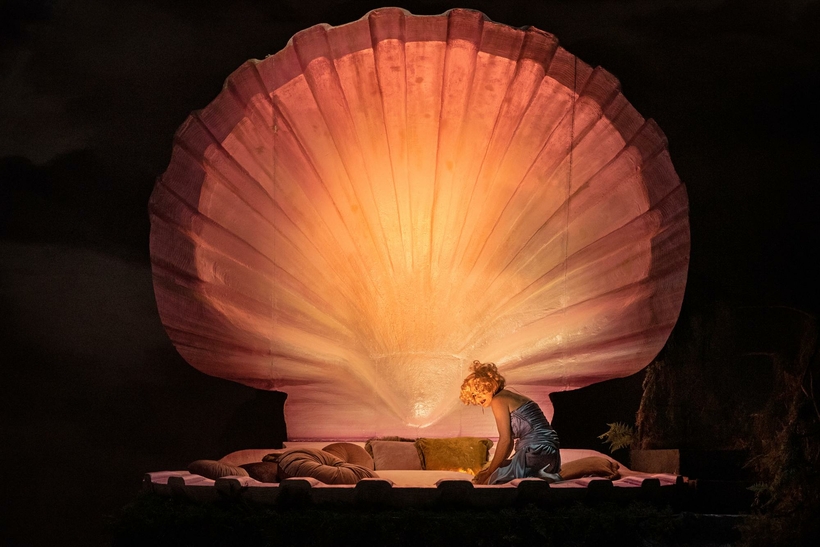Unveiled on June 2, Philipp Stölzl and Philipp M. Krenn’s new production of Antonín Dvořák’s Rusalka for the Dutch National Opera, in Amsterdam, takes its place in a bewitching nebula of fey yet sinister fairy tales for grownups. The sensibility evokes George Balanchine’s dance pantomime La Sonnambula (1946), Michael Powell and Emeric Pressburger’s celluloid melodrama The Red Shoes (1948), Jules Feiffer’s graphic novelette Passionella (1957), and Matthew Bourne’s Goreyesque reboot of Swan Lake (1995).The formula? Take equal parts camp, kitsch, and irony, then spike with noir to taste, and if Fortune loves you, here’s what you get: sardonic cartoons steeped in heartfelt despair.
Close kin to Hans Christian Andersen’s maritime Little Mermaid, Dvořák’s no-name antiheroine is a sprite of freshwater lakes and rivers (that’s what the word rusalka means). Smitten by a prince for whom she is scarcely a ripple in the water, she’ll pay any price to cross over to a human existence. Stölzl and Krenn locate Rusalka’s primal realm of the elements in the Depression-era United States, on a mean, nocturnal Main Street where bullies of all stripes prey on the weak. It’s here, among pimps and the sex workers they brutalize, that we meet our bedraggled Rusalka, a strung-out substance abuser lost in a Technicolor skipper-meets-mermaid extravaganza currently playing at the local movie palace.

From the hands of a beautician with a sideline in Brazilian-style cosmetic surgery, Rusalka the Blonde Bombshell emerges, all set to melt into her escapist fantasy and live happily ever after. Instead, she lands on a back lot where her dreamboat is on the job filming a sequel with his glamorous, hard-as-nails costar from Skipper Meets Mermaid, Part I. To Rusalka’s dismay, La La Land is every bit as soul-crushing as the street. So much for the classic dichotomy of clueless Innocence and bitter Experience. Yet the new focus on fantasy, self-delusion, and disillusionment goes straight to the heart of Dvořák’s fable.
There’s electric rivalry between Johanni van Oostrum’s hard-pressed Rusalka and Annette Dasch as the bitch diva Dvořák calls the Foreign Princess. As the Prince the women vie for, Pavel Černoch plays a randy, happy-go-lucky matinee idol in the tradition of Don Ameche. The witch Ježibaba, who pulls no punches with Rusalka, is often played for laughs, but not this time. With her voluptuous, leonine mezzo, her self-confidence, and lightning flashes of pitiless majesty, Raehann Bryce-Davis’s Jezi the Beautician rules as voodoo queen of the urban jungle.
The conductor is Joana Mallwitz, with Amsterdam’s princely Concertgebouw Orchestra at her fingertips, realizing the score’s weltschmerz and splashy brilliance in colors that are rich yet transparent. Of course, the sound had more vibrancy in the theater, but on video, the balance with the voices is better, much to the benefit of some weaker members of the cast. There’s a narrative advantage, too. Without losing sight of the main action, the cameras pick up, as if in passing, all sorts of Easter eggs undetectable from across the footlights.
Rusalka is available for streaming on the OperaVision Web site
Matthew Gurewitsch writes about opera and classical music for AIR MAIL. He lives in Hawaii

